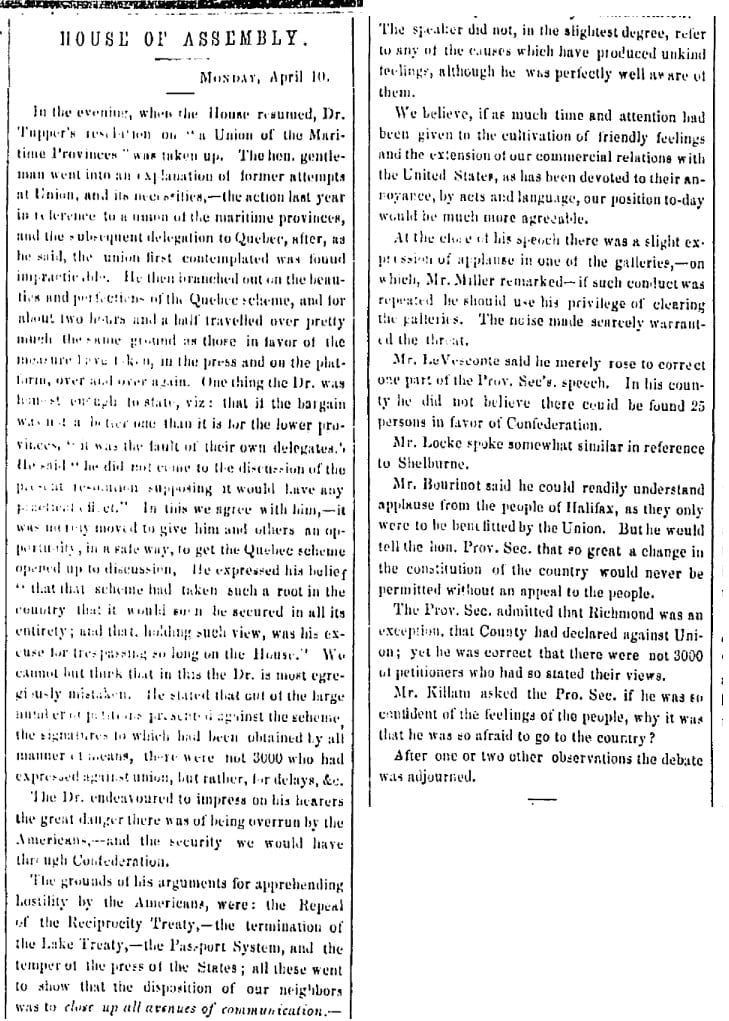
House of Assembly – Monday, April 10.
In the evening, when the house resumed, Dr. Tupper’s resolution on “a Union of the Maritime Provinces” was taken up. The hon. gentleman went into an explanation of former attempts at Union, and its necessities, -the action last year in reference to a union of the maritime provinces, and the subsequent delegation to Quebec, after, as he said, the union first contemplated was found impactable. He then branched out on the beauties and particulars of the Quebec scheme, and for about two hours and a half travelled over pretty much the same ground as those in favor of the measure have taken, in the press and on the platform, over and over again. One thing the Dr. was honest enough to state, viz: that if the bargain was not a better one than it is for the lower provinces, “it was the fault of their own delegates.” He said “he did not come to the discussion of the present question supposing it would have any particular effect.” In this we agree with him, -it was moved to give him and others an opportunity, in a safe way, to get the Quebec scheme opened up to discussion. He expressed his belief “that that scheme had taken such a root in the country that it would soon be secured in all its entirety; and that, holding such view, was his excuse for trespassing so long on the House.” We cannot but think that in this the Dr. is most egregiously mistaken. He stated that out of the large amount of patriots presented against the scheme, the signatures to which had been obtained by all manner of means, there were not 3000 who had expressed against union, but rather for delays, &c.
The Dr. endeavored to impress on his hearers the great danger there was of being overrun by the Americans, -and the security we would have though Confederation.
The grounds of his arguments for apprehending hostilities by the Americans, were: the Repeal of the Reciprocity Treaty, -the termination of the Lake Treaty, -the Passport System, and the temper of the press of the States; all these went to show that the disposition of our neighbors was to close up all avenues of communication. -The speaker did not, in the slightest degree, refer to any of the causes which have produced unkind feelings, although he was perfectly well aware of them.
We believe, if as much time and attention had been given to the cultivation of friendly feelings and the extension of our commercial relations with the United States, as has been devoted to their annoyance, by acts and language, our position today would be much more agreeable.
At the close of his speech there was a slight expression of applause in one of the galleries, -on which, Mr. Miller remarked – if such conduct as repeated he should use his privilege of clearing the galleries. The noise made scarcely warranted the threat.
Mr. LeVesconte said he merely rose to correct one part of the Prov. Sec’s speech. In his county he did not believe there could be found 25 persons in favor of Confederation.
Mr. Locke spoke somewhat similar in reference to Shelburne.
Mr. Bourinot said he could readily understand applause from the people of Halifax, as they only were to be benefitted by the Union. But he would tell the hon. Prov. Sec. that so great a change in the constitution of the country would never be permitted without an appeal to the people.
The Prov. Sec. admitted that Richmond was an exception, that County had declared against Union; yet he was correct that there was not 3000 of petitioners who had stated their views.
Mr. Killam asked the Pro. Sec. if he was so confident of the feelings of the people, why it was that he was so afraid to go to the country?
After one or two other observations the debate was adjourned.
Halifax Morning Sun, April 12, 1865. Page 3 Column 4. https://news.google.com/newspapers?nid=dw5aoL0HVgwC&dat=18650412&printsec=frontpage&hl=en
